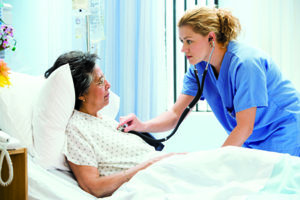Skilled nursing operators can reduce costs and increase revenues, potentially by millions, by having staff members focus on detecting illnesses earlier to avoid hospitalization, according to a new study.

New research by a University of Missouri team shows that 11 providers in the St. Louis area were able to recapture $32 million in revenue over six years by reducing avoidable hospitalizations.
“Early illness recognition is key to identifying clinical problems before they become much worse, and the advanced practical registered nurses played a big role in helping the staff make the proper assessments,” lead author Marilyn Rantz said in a statement Tuesday. Rantz serves as Curators’ Professor Emerita at the university’s Sinclair School of Nursing.
“Whether it’s pneumonia, the flu or a urinary tract infection, If the care providers are letting patients’ health decline to the point where you have no choice but to transfer them to the hospital, you let the problem go way too long,” she added.
Rantz and team used data from 11 facilities that participate in the Missouri Quality Improvement Initiative offered through the Centers for Medicare & Medicaid Services.
The program focuses on reducing avoidable hospital admissions and readmissions, improving resident outcomes, the process of transitioning between inpatient hospitals and nursing homes and reducing overall healthcare spending without restricting access to care. Key components of the program include a full-time APRN in each facility and an operations support team to implement the program’s initiatives.
In total, researchers found that the combined potential revenue recapture for both short- and long-stay residents totaled $32.5 million from 2014 to 2019. For each nursing home, the recaptured revenue ranged between $590,000 to more than $5 million.
Investigators also found that on average an additional $500,000 of revenue each year per 200 beds could have been recaptured by further reducing hospitalizations by focusing on early detection of health changes in residents.
The additional support of an APRN on staff also helped improve the care delivery of other workers and reduce turnover for the providers.
“We found the more support you give the nursing staff, the greater the impact on reducing staff burnout and turnover,” Rantz said. “Staffing is the number one cost for nursing homes, and we found the recaptured revenue from reducing avoidable hospitalizations helps pay and retain staff who are well educated and skilled at their job.”
Full study findings were published in the latest issue of the Journal of Nutrition, Health and Aging.





